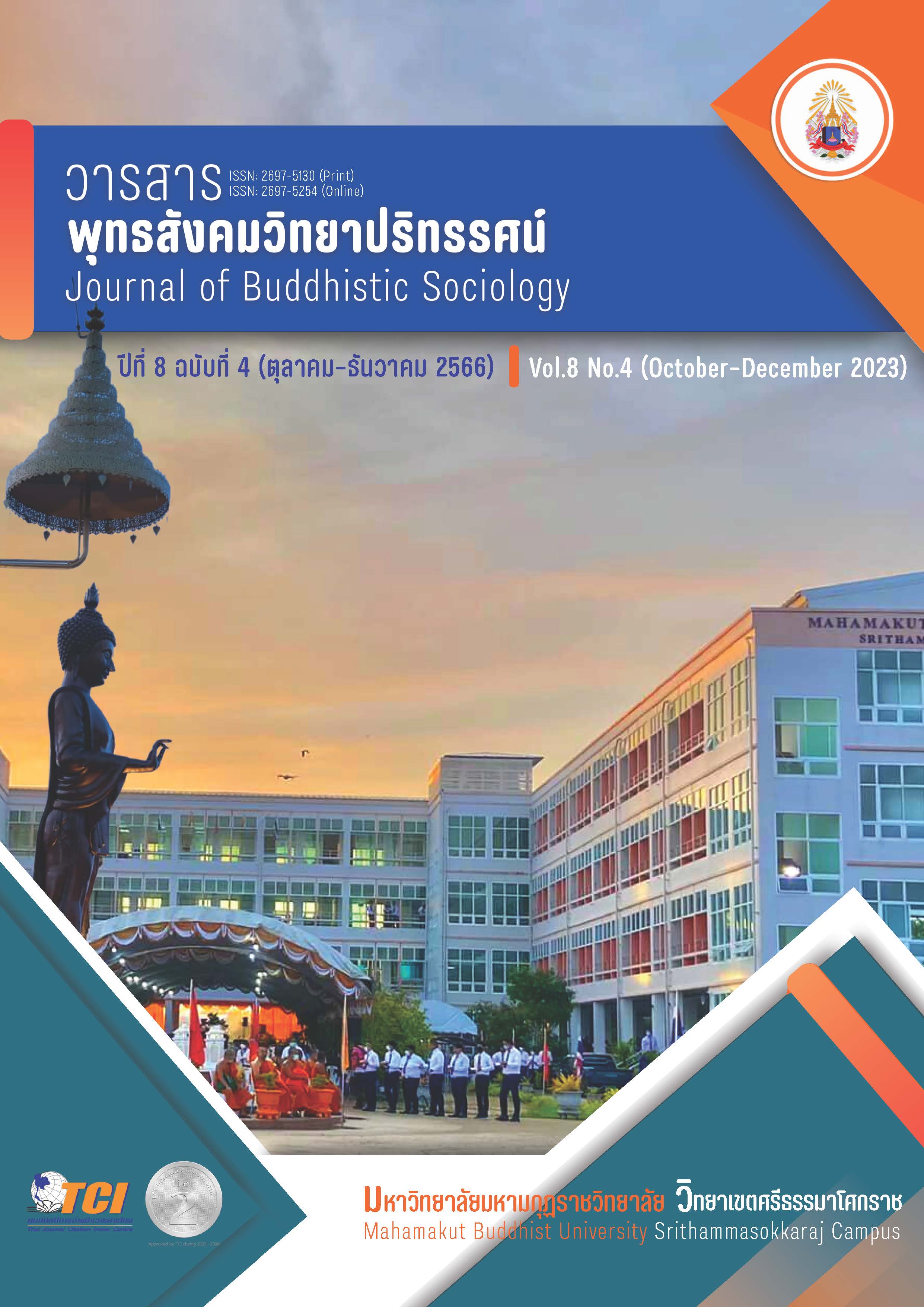การขัดเกลาชีวิตของประชาชนตำบลคลองน้อย อำเภอเมือง จังหวัดสุราษฎร์ธานี ด้วยหลักเบญจศีล
Main Article Content
บทคัดย่อ
สารนิพนธ์นี้ มีวัตถุประสงค์ดังนี้ 1) เพื่อศึกษาการขัดเกลาชีวิตของประชาชนตำบลคลองน้อย อำเภอเมือง จังหวัดสุราษฎร์ธานี ด้วยหลักเบญจศีล และ 2) เพื่อศึกษาข้อเสนอแนะแนวทางการขัดเกลาชีวิตของประชาชนตำบลคลองน้อย อำเภอเมือง จังหวัดสุราษฎร์ธานี ด้วยหลักเบญจศีล เป็นการวิจัยแบบผสมผสาน (Mixed Methods Research) ในการวิจัยเชิงปริมาณ เก็บรวบรวมข้อมูลจากประชาชนที่อาศัยอยู่ในตำบลคลองน้อย จำนวน 353 คน สถิติที่ใช้ ได้แก่ ค่าความถี่ ค่าร้อยละ ค่าเฉลี่ย และส่วนเบี่ยงเบนมาตรฐาน ส่วนการวิจัยเชิงคุณภาพ เก็บรวบรวมข้อมูลด้วยแบบสัมภาษณ์เชิงลึกแบบมีโครงสร้าง จากผู้ให้ข้อมูลสำคัญจำนวน 5 ราย
ผลการวิจัยพบว่า
1. การขัดเกลาชีวิตของประชาชนตำบลคลองน้อย อำเภอเมือง จังหวัดสุราษฎร์ธานี ด้วยหลักเบญจศีล โดยรวม อยู่ในระดับมากที่สุด (=4.42) เมื่อพิจารณาเป็นรายด้าน พบว่า ด้านที่มีค่าเฉลี่ยมากสุด คือ ด้านการเว้นจากการประพฤติผิดในกาม (
=4.77) รองลงมา ได้แก่ ด้านการเว้นจากการลักทรัพย์ มีค่าเฉลี่ยอยู่ในระดับมากที่สุด (
=4.71) และด้านที่มีค่าเฉลี่ยน้อยสุด คือ ด้านการเว้นจากการดื่มสุราเมรัย มีค่าเฉลี่ยอยู่ในระดับมาก (
=3.89) ตามลำดับ
2. ข้อเสนอแนะแนวทางในการขัดเกลาชีวิตของประชาชนตำบลคลองน้อย อำเภอเมือง จังหวัดสุราษฎร์ธานี ด้วยหลักเบญจศีล พบว่า ควรเกิดจากความร่วมมือจากทุกภาคส่วน เริ่มที่ครอบครัว และผู้นำในชุมชน ที่ต้องเป็นแบบอย่างในการปฏิบัติตัวให้อยู่ในศีลในธรรม ควรจัดกิจกรรมที่ส่งเสริมการรักษาศีล 5 เพื่อให้คนในชุมชนใช้ชีวิตบนพื้นฐานศีลธรรมอันดีงาม และก่อให้เกิดประโยชน์สุขต่อสังคมต่อไป
Article Details

อนุญาตภายใต้เงื่อนไข Creative Commons Attribution-NonCommercial-NoDerivatives 4.0 International License.
เอกสารอ้างอิง
พระครูโกศลพัชราศัย (ประทวน ศรจันทร์). (2564). วิธีการรักษาศีล 5 ตามนโยบายของโครงการหมู่บ้านศีล 5 ของชุมชนในตำบลปากช่อง อำเภอหล่มสัก จังหวัดเพชรบูรณ์. ใน ปริญญาพุทธศาสตรดุษฎีบัณฑิต สาขาวิชาพระพุทธศาสน์. มหาวิทยาลัยมหาจุพาลงกรณราชวิทยาลัย.
พระพรหมคุณาภรณ์ (ป.อ.ปยุตฺโต). (2549). ความจริงแห่งชีวิตและช่วยให้ตายเร็วหรือช่วยให้ตายดี. กรุงเทพมหานคร: พิมพ์สวย.
พระพรหมคุณาภรณ์ (ป.อ.ปยุตฺโต). (2552). พุทธธรรมฉบับปรับปรุงและขยายความ (พิมพ์ครั้งที่ 15). กรุงเทพมหานคร: โรงพิมพ์บริษัทสหธรรมิก จำกัด.
พระพิรุฬห์ลักษณ์ ฐิตธมฺโม. (2559). การประยุกต์หลักศีล 5 เพื่อพัฒนาพฤติกรรมของชาวบ้านชุมชนบ้านใหม่พัฒนา ตำบลศรีวิไล อำเภอศรีวิไล จังหวัดบึงกาฬ. ใน รายงานการวิจัย. มหาวิทยาลัยมหาจุฬาลงกรณราชวิทยาลัย วิทยาเขตหนองคาย.
พระวิมาน คมฺภีรปญฺโญ. (2554). ย้อนรอยประวัติหลวงปู่พระครูโพธิสารคุณ. ขอนแก่น: โรงพิมพ์คลังนานาวิทยา.
พระโอภาส โอภาโส (นาคฤทธิ์). (2564). ภาวะวิกฤตสังคมไทยจากกรณีการละเมิดศีลห้า. วารสารมหาจุฬานาครทรรศน์, 8(3), 129-142.
มัลลิกา บุนนาค. (2537). สถิติเพื่อการตัดสินใจ. กรุงเทพมหานคร: ภาควิชาสถิติ คณะพาณิชยศาสตร์และการบัญชี จุฬาลงกรณ์มหาวิทยาลัย.
วาสนา เล่าตง. (2555). คุณภาพชีวิตผู้สูงอายุชมรมผู้สูงอายุในเทศบาลตำบลเกาะสีชัง อำเภอเกาะสีชัง จังหวัดชลบุรี. ใน วิทยานิพนธ์ปริญญารัฐศาสตรมหาบัณฑิต สาขาวิชาเศรษฐศาสตร์การเมืองและการบริหารจัดการ. คณะรัฐศาสตร์และนิติศาสตร์ มหาวิทยาลัยบูรพา.
สมเด็จกรมพระยาดำรงราชานุภาพ. (2516). จามเทวีวงศ์ พงศาวดารเมืองหริภุญไชย. พระนครศรีอยุธยา: ห้างหุ้นส่วนจำกัดบรรณกิจเทรดดิ้ง.
องค์การบริหารส่วนตำบลคลองน้อย. (2555). แผนยุทธศาสตร์การพัฒนา อบต.คลองน้อย. สุราษฎร์ธานี: องค์การบริหารส่วนตำบลคลองน้อย.
เอกมงคล เพ็ชรวงษ์. (2563). การศึกษาพฤติกรรมการรักษาศีล 5 ของพุทธศาสนิกชนจังหวัดสุพรรณบุรี. ใน รายงานการวิจัย. มหาวิทยาลัยมหาจุฬาลงกรณราชวิทยาลัย.
Taro Yamane. (1973). Statistics: An Introductory Analysis (3rd ed). New York: Harper and Row.


